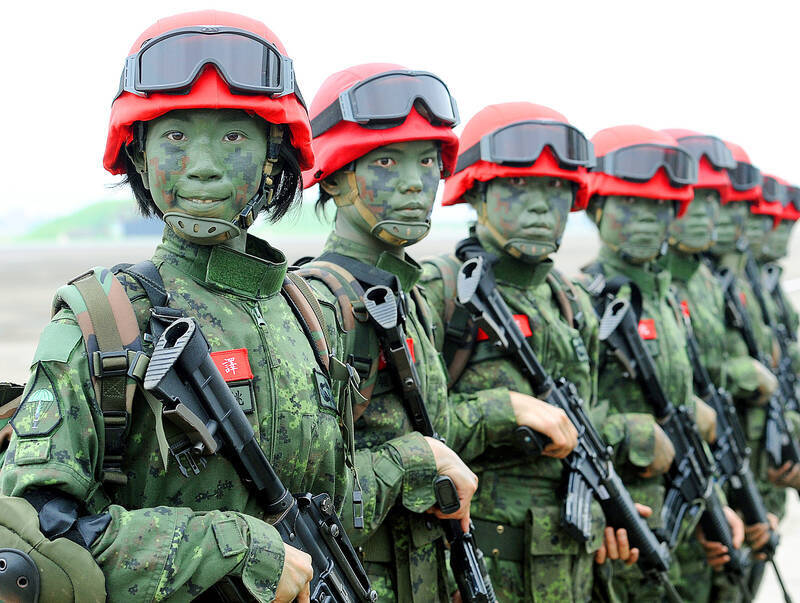Democratic Progressive Party (DPP) lawmakers have proposed an amendment to military regulations that would automatically incorporate retired female officers and noncommissioned officers into the armed forces reserves.
DPP Legislator Lee Po-yi (李柏毅) sponsored the bill to amend Article 55 of the Act of Military Service for Officers and Non-commissioned Officers of the Armed Forces (陸海空軍軍官士官服役條例), with 15 DPP legislators cosigning it.
Under the current version of the act, commissioned and noncommissioned female military officers can become reservists, but they are not required to do so, except for those who joined through military academies or universities before 1997.

Photo: Fang Pin-chao, Taipei Times
The DPP lawmakers said they proposed the amendment to bolster military reserves, promote equality and bring provisions in line with a new system for refresher training for reservists.
Chinese Nationalist Party (KMT) Legislator Hsu Chiao-hsin (徐巧芯) yesterday expressed support for the bill, calling it unfair to require only men who served in the military to join the reserves.
“Men and women have physiological differences, but their ability and obligation to serve the nation is the same,” Hsu said.
The unequal treatment for men and women under the law is from a different time, KMT Legislator Chang Chia-chun (張嘉郡) said, adding that she supports the proposal to make the regulations conform to modern values of equality.
“Even so, it is more important to the welfare of the people that national security is protected comprehensively through measures that support regional peace,” she said.
Taiwan People’s Party (TPP) Legislator Chen Chao-tzu (陳昭姿) said she would support the bill, as citizens have a constitutional obligation serve in the military.
The proposed measure would have a limited effect on increasing the number of reservists the nation can call to arms, as women comprise a small minority of military service members, TPP Legislator Lin Yi-chuan (林憶君) said.
Last year, women made up 10 percent of retiring military officers, 14 percent of retiring noncommissioned officers and 12 percent of enlisted personnel, Lin said.
Since 2021, 8,915 women have become reservists, but only 3,086 were volunteers, meaning 65 percent did not want to serve, she said.
If adopted, the amendment would increase the number of unwilling reservists, which would likely have a negative effect on morale and erode combat effectiveness, Lin said.
“The Ministry of National Defense should not think that changing the law to compel military service is a work-around for not being able to inspire service members to join the reserves,” she said.
Additional reporting by Chen Cheng-yu

A Ministry of Foreign Affairs official yesterday said that a delegation that visited China for an APEC meeting did not receive any kind of treatment that downgraded Taiwan’s sovereignty. Department of International Organizations Director-General Jonathan Sun (孫儉元) said that he and a group of ministry officials visited Shenzhen, China, to attend the APEC Informal Senior Officials’ Meeting last month. The trip went “smoothly and safely” for all Taiwanese delegates, as the Chinese side arranged the trip in accordance with long-standing practices, Sun said at the ministry’s weekly briefing. The Taiwanese group did not encounter any political suppression, he said. Sun made the remarks when

The Taiwanese passport ranked 33rd in a global listing of passports by convenience this month, rising three places from last month’s ranking, but matching its position in January last year. The Henley Passport Index, an international ranking of passports by the number of designations its holder can travel to without a visa, showed that the Taiwan passport enables holders to travel to 139 countries and territories without a visa. Singapore’s passport was ranked the most powerful with visa-free access to 192 destinations out of 227, according to the index published on Tuesday by UK-based migration investment consultancy firm Henley and Partners. Japan’s and

BROAD AGREEMENT: The two are nearing a trade deal to reduce Taiwan’s tariff to 15% and a commitment for TSMC to build five more fabs, a ‘New York Times’ report said Taiwan and the US have reached a broad consensus on a trade deal, the Executive Yuan’s Office of Trade Negotiations said yesterday, after a report said that Washington is set to reduce Taiwan’s tariff rate to 15 percent. The New York Times on Monday reported that the two nations are nearing a trade deal to reduce Taiwan’s tariff rate to 15 percent and commit Taiwan Semiconductor Manufacturing Co (TSMC, 台積電) to building at least five more facilities in the US. “The agreement, which has been under negotiation for months, is being legally scrubbed and could be announced this month,” the paper said,

NATIONAL SECURITY THREAT: An official said that Guan Guan’s comments had gone beyond the threshold of free speech, as she advocated for the destruction of the ROC China-born media influencer Guan Guan’s (關關) residency permit has been revoked for repeatedly posting pro-China content that threatens national security, the National Immigration Agency said yesterday. Guan Guan has said many controversial things in her videos posted to Douyin (抖音), including “the red flag will soon be painted all over Taiwan” and “Taiwan is an inseparable part of China,” while expressing hope for expedited “reunification.” The agency received multiple reports alleging that Guan Guan had advocated for armed reunification last year. After investigating, the agency last month issued a notice requiring her to appear and account for her actions. Guan Guan appeared as required,